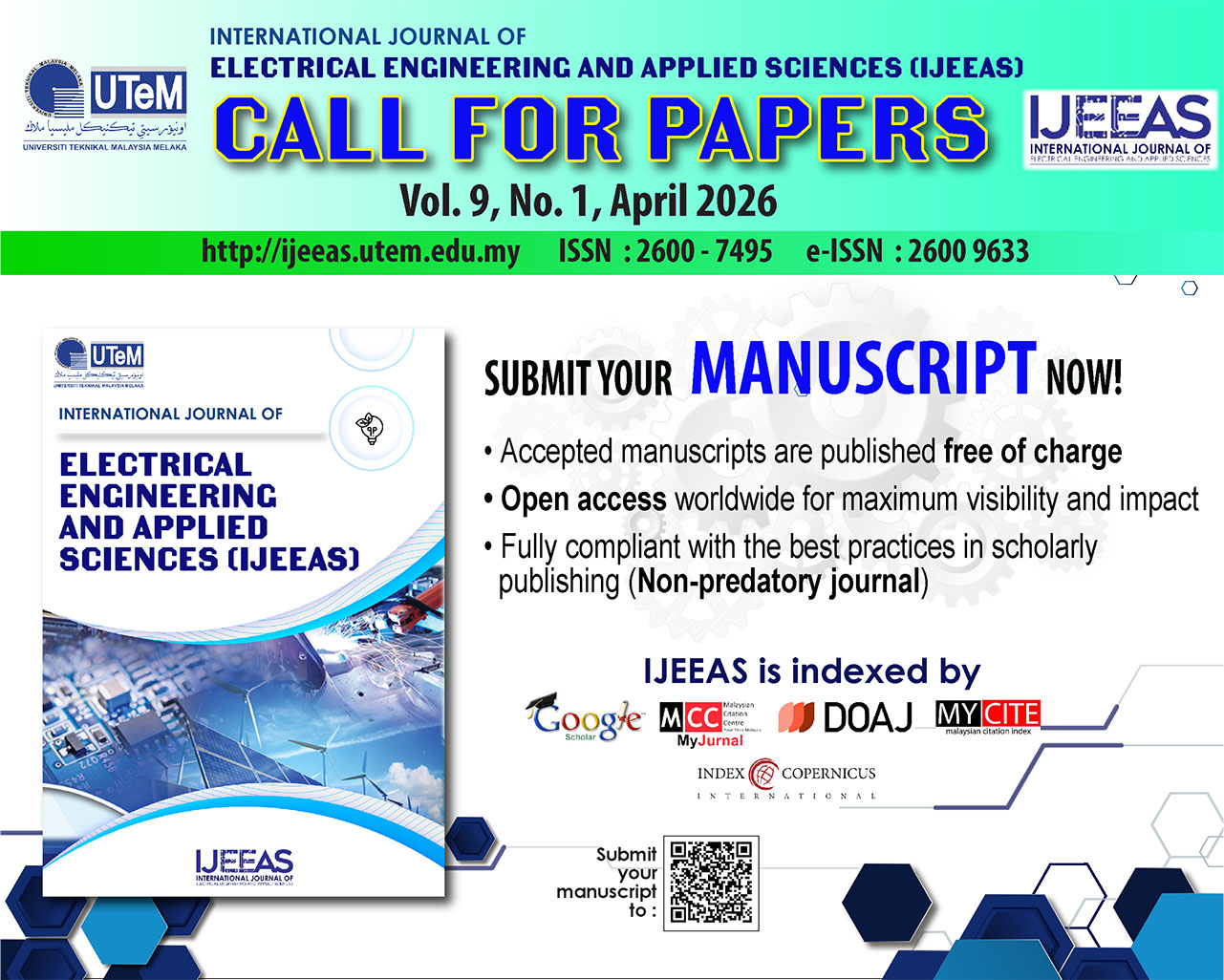A Study on Low Cost Microcontrollers for Converter Applications
Keywords:
single phase inverter, P- voltage control, MATLAB, Raspberry PI, ArduinoAbstract
In this project, the development of a control system based on single phase inverter in hardware and simulation have been conducted to study the use of low-cost microcontroller for converter application. Therefore, this project aims to develop a voltage control system that can be designed in Raspberry Pi and Arduino to understand the effectiveness of the microcontrollers. The inverter voltage is being controlled using Pulse Width Modulation (PWM) that is modelled using a feedback control using the MATLAB Simulink as a code generation. At the meantime, the Proportional (P) control has been used for the inverter output control in order the output voltage to follow the target reference value. This study has been divided into two stages where the MATLAB simulation has been developed for determined the control response for the single-phase inverter when using the Raspberry PI and Arduino as the source generation. After it has been successfully designing deed, the hardware has been set up to see the operation of the inverter with the voltage control that has been built in the MATLAB, by connecting to a resistive load as to represent any household applications such as a fluorescent lamp. The results show that, by using these low-cost microcontrollers, the controller is more accessible to be developed in the MATLAB and able to respond well to the hardware.
Downloads
References
E. Cherian, G. R. Bindu, and P. S. C. Nair, Pollution impact of residential loads on distribution system and prospects of DCdistribution, International Journal Engineering Science and Technology, vol, 1,. 4,pp.1655-1660,2016
M. Stork and D. Mayer, Reactive power in circuits with sampled resistive load, Journal of Electrical Engineering, vol.68,5,pp. 357–363, 2017.
M. S. Metwally, E.A. El-Bidweihy, A.El-Tobshy, H.M. El-Bolok, A New Single Phase AC Controller for Resistive Loads,IEEE Transcaction on Industrial Electronics and Contol Instrumention vol. I, no. 3, pp. 2–6, 1977.
Z. Akhtar, B. Chaudhuri and S. Y. R. Hui, Smart Loads for Voltage Control in Distribution Networks, IEEE Transactionson Smart Grid, vol. 8, no. 2, pp. 937-946, March 2017.
F. Boeren, System Identification for Feedforward and Feedback Control With Application to Semiconductor Manufacturing. 2016.
A. Ruszczyk, Minimization current error area of the DC / AC inverter controlled by predictive current control method, Bulletin of the Polish Academy of Sciences, Technical Sciences,
. vol. 54, no. 3, pp279-285, 2006.
L. Safari and S. Minaei, A Low-Voltage Low-Power Resistor- Based Current Mirror and Its Applications, Journal of Circuits,Systems and Compiuters¤,” vol. 26, no. 11, pp. 1–18, 2017.
S.A.Zulkifli, M.Z. Zakaria, Development of Single Phase Back to Back Converter with Closed Loop Voltage Feedback Controlled by Arduino Microcontroller, International Journal
of Integrated Engineering, Vol 8, No 1 (2016).
S.A. Zulkifli, F.N.F. Ramli, S.Razali, Undergraduate Student Experinece in Development of ZVS Power Converter for Voltage Control with Low Cost Microcontroller, 2016 IEEE
International Conference on Automatic Control and Intelligent System”, pp. 55-60, 2016.
H. Chaudhari, Raspberry Pi Technology : A Review, International Journal of Innovative and Emerging Research in Engineering, vol. 2, no. 3, pp. 83–87, 2015.
Downloads
Published
How to Cite
Issue
Section
License
Authors who publish with this journal agree to the following terms:
- Authors retain copyright and grant the journal right of first publication with the work simultaneously licensed under a Creative Commons Attribution License that allows others to share the work with an acknowledgement of the work's authorship and initial publication in this journal.
- Authors are able to enter into separate, additional contractual arrangements for the non-exclusive distribution of the journal's published version of the work (e.g., post it to an institutional repository or publish it in a book), with an acknowledgement of its initial publication in this journal.
- Authors are permitted and encouraged to post their work online (e.g., in institutional repositories or on their website) prior to and during the submission process, as it can lead to productive exchanges, as well as earlier and greater citation of published work (See The Effect of Open Access).







